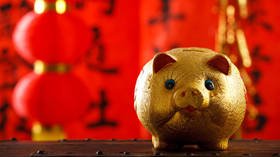Chinese banks now hold over $1 TRILLION in foreign reserves

Foreign currency deposits in Chinese banks jumped by more than $260 billion in the year through May, having surpassed $1 trillion for the first time. That could allow greater freedom for capital to flow out of the country.
The pool’s growth came as surging demand for Chinese goods during the Covid pandemic boosted the foreign earnings of exporters. The resilient economy and strengthening currency have lured foreign investors to sell dollars for yuan to buy Chinese stocks and bonds.
“Strong capital inflows offer a good window for China to carry out capital-account reforms and relax two-way capital flows,” said Linan Liu, Greater China macro strategist at Deutsche Bank AG in Hong Kong. She told Bloomberg: “I expect further relaxation of capital outflows via investment schemes.”
Data from the People’s Bank of China (PBOC) showed that the country’s commercial lenders had a record $1.38 trillion of foreign exchange by the end of May, with the majority being held in deposits. The banks used most of that cash to make loans to firms onshore and overseas. The PBOC’s foreign reserves also soared to a five-year high last month.
Also on rt.com Chinese yuan hits 3-year high against US dollarRapid capital inflows have been pushing dollar deposit rates in China down to near all-time lows. The PBOC is already taking steps to reduce dollar liquidity, including easing capital controls. The regulator has increased the quota for investors to buy overseas assets to a record in June, and is expected to set up a trading link for wealth products between the mainland and Hong Kong.
According to Research Associate George Magnus at Oxford University’s China Centre, some officials “may see the foreign-exchange liquidity as a feather in China’s cap, and some may worry that the surge is flighty.” He said that “It’s fine when the flows are coming in, but a big problem for financial stability when they try and go the other way.”
Magnus said the increase in dollar deposits is “random and most likely temporary,” and will slow when other countries recover from the coronavirus crisis.
For more stories on economy & finance visit RT's business section













